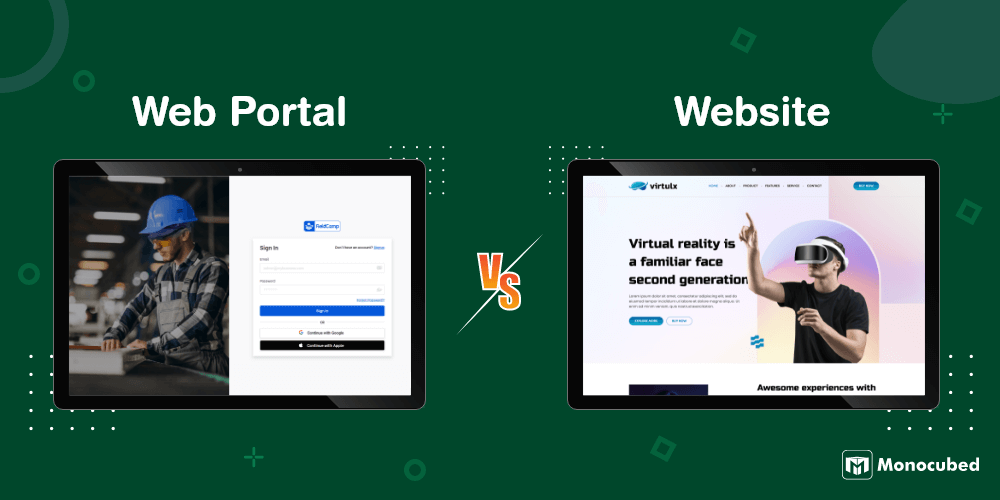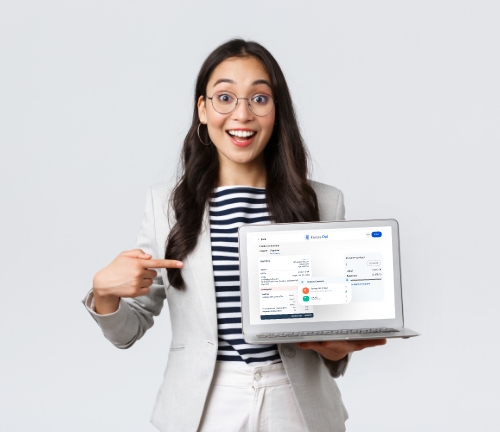If you want to understand what is the basic difference between web portal vs website, then this blog is for you.
According to Statista, in 2020, over two billion people purchased goods or services online, and the e-retail sales in the same year surpassed 4.2 trillion U .S. dollars worldwide.
But choosing between a website and a web portal appears to be one of the often asked questions.
Let’s simplify this to help you make a better decision.
Even though they both consist of a web-based interface, these are entirely used for different purposes and can be a public website or a specially designed website with login protected features.
Read on to know what websites and web portals are and how they differ from each other.
Contents
What is a Website?
A website is a collection of interlinked web pages hosted with the same domain name and published on at least one web server.
To simplify it further, it is an interlinked collection of web pages grouped in various ways. For example, Monobubed.com, Amazon.com, etc.
Now you might ask what a webpage or a web server is.
What is a web page?
A webpage is just like a document page connected to the world wide web and can be viewed on web browsers like Google Chrome, Mozilla Firefox, Microsoft Edge, Apple Safari, and others and with the help of search engines such as Google, Yahoo.
What is a web server?
A web server hosts these webpages on the internet in a string of letters and numbers called a domain name.
You know what is a web page and what is a web server.
Now, let’s understand the different types of a website.
So, what are the different types of a website?
There are three types of websites:
-
Static websites
These are web pages with fixed content, whether plain texts or enriched with media like images, video, digital brochures and pamphlets. A fixed content means that regardless of the time a user reaches the website, it won’t change.
-
Dynamic websites
The dynamic websites are updated automatically, depending on parameters like templates, content, scripts, etc. So, whenever a user visits a website, the content is renewed.
-
Interactive website
These websites are rich with graphics and engaging content, which helps retain the users. Even users can post their comments or leave feedback.
These websites are a great way to connect with your users, and most businesses prefer these types of websites. It is more convenient to develop a website if you choose to hire web developers that have experience in building high-end websites for any industry.
Now that you know what a website is, let’s understand what a web portal is.
Looking for a Website Development Company?
Talk to us. Share your requirements with our web developers and get free consultation.
What is a Web Portal?
A web portal is like a user centric management system that enables businesses or organizations to create, exchange, and share information that can be reused in the future.
Unlike webpages, web portals are private locations on the internet with specific URLs.
Users must enter their login credentials to access them because the content changes from one person to another.
The web portals are designed to attract a specific audience experience, controlling users’ functionality on your page, multiple source integrations to provide uniform information, and other user management and permitting features.
There are a few web portal examples where the content is unique for every customer and has a business intelligence analysis feature.
There are two types of portals that you can choose from
-
Horizontal Web Portals
Also known as horizontal enterprise portals, they give the user a convenient gateway to access all kinds of information which a user may require while using these services. A
Which are the examples of horizontal web portals?
Yahoo and AOL are examples of horizontal portals.These offer their users gateways to the web with links to breaking news, mail, social media, etc.
-
Vertical Web Portals
Also known as vertical enterprise portals, these are user-centric portals that offer information about a specific company, interest, or service.
These portals can be useful to a user looking for information about a specific topic or a specific company.
Which are the examples of vertical portals?
Vertical portals include college portals, tender and bidding portals, and so on.
The Key Difference Between a Website and Web Portal
Imagine you’re looking for a place to eat and come across the website of a new restaurant. The website includes the restaurant’s menu, takeaway options, a gallery, contact information, and possibly information about upcoming events and special offers. You’ve just arrived at a website.
Imagine you’re a student using a browser to access your college account. You access your college web portal, which provides authorized access to your account, various services and products, and detailed information on your grades, fees, and parent details.
Both a website and web portal may have similar features and goals.
But what is the difference between portal and website?
Let’s understand the key difference between a web portal and a website in 3 areas:
| Comparison Factors | Website | Web portal |
|---|---|---|
| Aim | To promote product or services to audience | Targets a specific group of audience |
| Benefit |
|
|
| Features |
|
|
Now that you have knowledge about the features and benefits of using a website and web portal, let’s understand which technology is the best for a web development project.
Detailed Comparison of Web Portal and Website
Before you delve into the detailed comparison, you should know that a top-most web development company should be able to provide custom web development services according to your requirements.
Now, let’s examine the difference between website and web portal, explaining their distinctions in detail.
Complete Overview of a Website and Its Uses
If you aim to promote your services and products to the people, a website gives you the flexibility to inform your clients about your services and products through the related web pages.
Also, this will help you engage with them in lengthy interactions to persuade them to choose your company. And you can even host online forums.
The best thing about websites is that you can create numerous web pages, and they are pretty simple to make. You can even have an entire web page on a website explaining a single product.
You can create interactive websites on which users can post their comments or leave feedback on these websites. These are a great way to connect with your users, and most businesses prefer these types of websites.
They not only help you gauge users’ attention but also help boost sales. The cost of developing these websites differs from that of static and dynamic ones.
With SEO activities, you can increase your company’s visibility, create a lot of client awareness worldwide, and increase your business.
So, developing websites is a way to go if you aim to draw traffic from a wide audience base of anonymous users.
Complete Overview of a Web Portal and Its Uses
Web portals can be the best option if your goal is to improve customer/client/employee experience and develop continuous relationships with your audience.
By using a customer portal, you can offer personalized experiences, including order tracking, account management, and support services.
A web portal may have a custom workflow, personalized content for different roles/user categories, and even entire modules designed and built for specific end-users. Think of an eHealth portal with two interfaces, different features, and content for doctors and patients.
Developing web portals consists of several modules and is integrated with 3rd party services, which makes designing them a little complex. So, if you want to develop a feature-rich web portal for your business, get in touch with a leading web portal development company.
Web portal provides scalability, reliability, and high performance, which are all important factors for providing a good user experience. Portals are user-centric and create a unified web interface, allowing end-users to pull and access data from these sources based on permissions and roles.
Want to Develop a Web Portal for your Business?
We have built robust web portals for multiple industries to provide engaging development solutions for your business.
Web Portal vs Website – Who Wins the Battle?
It’s a tie!
A website and a web portal allow you to communicate with your target audience (customers, clients, partners, and employees), provide content, and sell products and services online.
The decision between a website and web portal difference will be influenced primarily by your objectives, existing technical infrastructure, and the resources available for developing a web-based system.
When to Use a Website?
Use a website if:
- You need the site to operate independently on an internal system.
- Where your primary focus is to deliver and manage the content to get traffic.
A website is an excellent choice when you want a site that operates independently of the internal network or system.
Creating a website would be beneficial when your focus is primarily on delivery and simple management of content and if you want to attract traffic from a large number of anonymous users, creating a website is the way to go and nowadays you can get the traffic with AI as well for your website.
When to Use a Web Portal?
Use a web portal:
- To integrate multiple systems into single visual design.
- To provide specific audience experience.
- To enhance customer company relations.
- If you need control over what your users see and access.
- To have advanced user management and user authority features.
It is also an excellent choice when integrating multiple systems into a single visual design, even if you want to provide more specific audience experiences and enhanced customer company relations.
Also, when you need advanced control over what your users see and access, a web portal would be a better option when you need advanced user management and user authority features. Going for web portals is a better choice if you aim at these.
FAQs
-
How much time does it take to develop a web portal from scratch?
-
What are some examples of vertical and horizontal portals in existence today?
-
What are the best web development languages?
-
What do you mean by a web address?
-
Why is web presence so important?
-
What are website designing services?
The answer is pretty straightforward. It completely depends on both your needs and the expertise of your web portal development company, and after that, the architecture and the web portal content to be published are hosted.
Building web portals can take 2-10 weeks to see a prototype and 2-5 months to have a working portal application.
The vertical portals include ESPN.com, iVillage, NFL.com, Blackvoices.com, WebMD, Aflcio.org, Gamers.com, Away.com, and T-online.
The horizontal or general portals include Earthlink.net, Lycos, Orange.co.uk, and Sympatico.msn.ca.
There are many web development languages in the industry, so choosing one is critical. The most common languages used for website development are JavaScript, HTML, CSS, and PHP.
According to Statista, Javascript is the most used language for websites and web portals.
The web address contains information about the web page’s location. It is also referred to as the URL (uniform resource locator).
A web address, like a street address, organizes information about the location of a web page in a predictable way.
For example http://www.google.com
Having an online presence allows you to build your brand and gain the credibility needed to attract more customers. Along with making your business readily accessible, an online presence also gives your customers an easy way to find out more about your offer.
A web design service provides a customized website design that is perfect for your business site. They’ll help you to create a design that matches your brand while giving your customers a seamless user experience that will delight them. When considering your website design, also keep in mind factors like logo design cost, as branding elements are essential for a cohesive online presence.
Starting With a Website or a Web Portal
If you have a question about the web portal vs. website, then We at Monocubed will help you determine which approach will better address your business goals and develop an effective development roadmap for websites and web portals.
We are a trusted web application development company based in Canada. We focus on delivering high-class web development solutions based on your specific business needs.
We follow a systematic approach and offer meaningful web design and development services to enterprises and individuals from various industries, whether re-engineering current or new business solutions from scratch.
We have designed and engineered various B2B and B2C portals for healthcare, education, eCommerce, and technology companies.
 By Jeel Patel
By Jeel Patel



